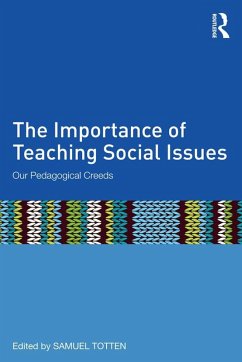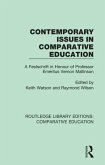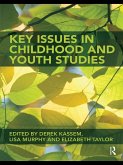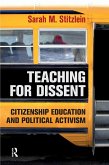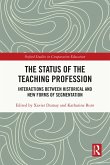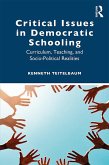The Importance of Teaching Social Issues (eBook, PDF)
Our Pedagogical Creeds
Redaktion: Totten, Samuel
52,95 €
52,95 €
inkl. MwSt.
Sofort per Download lieferbar

26 °P sammeln
52,95 €
Als Download kaufen

52,95 €
inkl. MwSt.
Sofort per Download lieferbar

26 °P sammeln
Jetzt verschenken
Alle Infos zum eBook verschenken
52,95 €
inkl. MwSt.
Sofort per Download lieferbar
Alle Infos zum eBook verschenken

26 °P sammeln
The Importance of Teaching Social Issues (eBook, PDF)
Our Pedagogical Creeds
Redaktion: Totten, Samuel
- Format: PDF
- Merkliste
- Auf die Merkliste
- Bewerten Bewerten
- Teilen
- Produkt teilen
- Produkterinnerung
- Produkterinnerung

Bitte loggen Sie sich zunächst in Ihr Kundenkonto ein oder registrieren Sie sich bei
bücher.de, um das eBook-Abo tolino select nutzen zu können.
Hier können Sie sich einloggen
Hier können Sie sich einloggen
Sie sind bereits eingeloggt. Klicken Sie auf 2. tolino select Abo, um fortzufahren.

Bitte loggen Sie sich zunächst in Ihr Kundenkonto ein oder registrieren Sie sich bei bücher.de, um das eBook-Abo tolino select nutzen zu können.
Through personal stories, each contributor to The Importance of Teaching Social Issues reveals the major concerns, tenets, and interests behind their own teaching and research, including the seminal experiences underlying their motivation to explore social issues vis-à-vis school curriculum.
- Geräte: PC
- mit Kopierschutz
- eBook Hilfe
- Größe: 1.02MB
Andere Kunden interessierten sich auch für
![Contemporary Issues in Comparative Education (eBook, PDF) Contemporary Issues in Comparative Education (eBook, PDF)]() Contemporary Issues in Comparative Education (eBook, PDF)34,95 €
Contemporary Issues in Comparative Education (eBook, PDF)34,95 €![Exploring Critical Issues in Gifted Education (eBook, PDF) Exploring Critical Issues in Gifted Education (eBook, PDF)]() Christine L. WeberExploring Critical Issues in Gifted Education (eBook, PDF)42,95 €
Christine L. WeberExploring Critical Issues in Gifted Education (eBook, PDF)42,95 €![Key Issues in Childhood and Youth Studies (eBook, PDF) Key Issues in Childhood and Youth Studies (eBook, PDF)]() Key Issues in Childhood and Youth Studies (eBook, PDF)39,95 €
Key Issues in Childhood and Youth Studies (eBook, PDF)39,95 €![Teaching for Dissent (eBook, PDF) Teaching for Dissent (eBook, PDF)]() Sarah Marie StitzleinTeaching for Dissent (eBook, PDF)46,95 €
Sarah Marie StitzleinTeaching for Dissent (eBook, PDF)46,95 €![Fairness Issues in Educational Assessment (eBook, PDF) Fairness Issues in Educational Assessment (eBook, PDF)]() Fairness Issues in Educational Assessment (eBook, PDF)47,95 €
Fairness Issues in Educational Assessment (eBook, PDF)47,95 €![The Status of the Teaching Profession (eBook, PDF) The Status of the Teaching Profession (eBook, PDF)]() The Status of the Teaching Profession (eBook, PDF)42,95 €
The Status of the Teaching Profession (eBook, PDF)42,95 €![Critical Issues in Democratic Schooling (eBook, PDF) Critical Issues in Democratic Schooling (eBook, PDF)]() Kenneth TeitelbaumCritical Issues in Democratic Schooling (eBook, PDF)42,95 €
Kenneth TeitelbaumCritical Issues in Democratic Schooling (eBook, PDF)42,95 €-
-
-
Through personal stories, each contributor to The Importance of Teaching Social Issues reveals the major concerns, tenets, and interests behind their own teaching and research, including the seminal experiences underlying their motivation to explore social issues vis-à-vis school curriculum.
Dieser Download kann aus rechtlichen Gründen nur mit Rechnungsadresse in A, B, BG, CY, CZ, D, DK, EW, E, FIN, F, GR, HR, H, IRL, I, LT, L, LR, M, NL, PL, P, R, S, SLO, SK ausgeliefert werden.
Produktdetails
- Produktdetails
- Verlag: Taylor & Francis eBooks
- Seitenzahl: 274
- Erscheinungstermin: 7. August 2014
- Englisch
- ISBN-13: 9781317657675
- Artikelnr.: 49353325
- Verlag: Taylor & Francis eBooks
- Seitenzahl: 274
- Erscheinungstermin: 7. August 2014
- Englisch
- ISBN-13: 9781317657675
- Artikelnr.: 49353325
- Herstellerkennzeichnung Die Herstellerinformationen sind derzeit nicht verfügbar.
Samuel Totten is Professor Emeritus of Curriculum and Instruction at the University of Arkansas.
Preface: Education in a Time of Crisis-H. Svi Shapiro. Introduction-Samuel
Totten. PART ONE: THE IMPERATIVE. 1. The Imperative to Incorporate a Study
of Social Issues into the School Curriculum-Samuel Totten. 2. The Social
Issues Education Imperative-William G. Wraga. 3. Authentic Teaching is
Venturing into Uncertainty-Geneva Gay. 4. Roots, Branches, and
Shoots-Margaret Smith Crocco. 5. A Creed for the Non-Religious:
Intellectual Freedom-Jack Nelson. 6. Opening Up to Inquiry-Jack Zevin. 7.
Teaching About Social Issues and Concerns Need Not Be an "All or None"
Circumstance-O.L. Davis. PART TWO: UNDERPINNING DEMOCRATIC SOCIETY. 8. The
Challenge of Teaching About and For Democracy when Democracy is so
Troubled-Diana E. Hess. 9. Imagining and Constructing Social Democracy: An
Educator's Creed-William R. Fernekes. 10. Preparing Effective Citizens via
an Issues Centered Approach-Mark A. Previte. 11. From Controversy to
Decisionmaking: The Heart of Social Issues Instruction-William B. Russell
III. PART THREE: CRITICAL STUDIES. 12. "Prepare to Be on Center Stage": A
Critical, Issues-Centered Approach to Teaching for Social
Understanding-Ronald W. Evans. 13. Teaching to Change the World?-Carlos
Alberto Torres. 14. Teaching for Change: Social Education and Critical
Knowledge of Everyday Life-E. Wayne Ross. 15. Knowledge, Education and
Power: A Social Justice Pedagogical Creed-Charlene Johnson-Carter. 16. From
Voicing to Naming to Re-humanization-Miguel Zavala. 17. Positionality,
Recognition, and Dialogue in Democratic Education-Steven P. Camicia. PART
FOUR: MOVING FROM THE CLASSROOM INTO THE WORLD. 18. Searching for
Understanding, Finding the Peacemakers-Elizabeth Yeager Washington. 19.
Delving into the World within and Beyond the Classroom Door: Lessons About
Inequality and Opportunity-Chara Haeussler Bohan. 20. Questioning and
Blurring Boundaries in a Context of Change: Science, Technology,
Engineering, and Mathematics (STEM) Education-Barbara Solomon Spector. 21.
Developing Global Consciousness-Merry M. Merryfield. 22. Big History as
Core Curriculum-Cynthia Brown. 23. The Centrality of Students and Their
Appreciation and Understanding of Social Issues-Robert E. Yager. Appendix:
"My Pedagogic Creed"-John Dewey.
Totten. PART ONE: THE IMPERATIVE. 1. The Imperative to Incorporate a Study
of Social Issues into the School Curriculum-Samuel Totten. 2. The Social
Issues Education Imperative-William G. Wraga. 3. Authentic Teaching is
Venturing into Uncertainty-Geneva Gay. 4. Roots, Branches, and
Shoots-Margaret Smith Crocco. 5. A Creed for the Non-Religious:
Intellectual Freedom-Jack Nelson. 6. Opening Up to Inquiry-Jack Zevin. 7.
Teaching About Social Issues and Concerns Need Not Be an "All or None"
Circumstance-O.L. Davis. PART TWO: UNDERPINNING DEMOCRATIC SOCIETY. 8. The
Challenge of Teaching About and For Democracy when Democracy is so
Troubled-Diana E. Hess. 9. Imagining and Constructing Social Democracy: An
Educator's Creed-William R. Fernekes. 10. Preparing Effective Citizens via
an Issues Centered Approach-Mark A. Previte. 11. From Controversy to
Decisionmaking: The Heart of Social Issues Instruction-William B. Russell
III. PART THREE: CRITICAL STUDIES. 12. "Prepare to Be on Center Stage": A
Critical, Issues-Centered Approach to Teaching for Social
Understanding-Ronald W. Evans. 13. Teaching to Change the World?-Carlos
Alberto Torres. 14. Teaching for Change: Social Education and Critical
Knowledge of Everyday Life-E. Wayne Ross. 15. Knowledge, Education and
Power: A Social Justice Pedagogical Creed-Charlene Johnson-Carter. 16. From
Voicing to Naming to Re-humanization-Miguel Zavala. 17. Positionality,
Recognition, and Dialogue in Democratic Education-Steven P. Camicia. PART
FOUR: MOVING FROM THE CLASSROOM INTO THE WORLD. 18. Searching for
Understanding, Finding the Peacemakers-Elizabeth Yeager Washington. 19.
Delving into the World within and Beyond the Classroom Door: Lessons About
Inequality and Opportunity-Chara Haeussler Bohan. 20. Questioning and
Blurring Boundaries in a Context of Change: Science, Technology,
Engineering, and Mathematics (STEM) Education-Barbara Solomon Spector. 21.
Developing Global Consciousness-Merry M. Merryfield. 22. Big History as
Core Curriculum-Cynthia Brown. 23. The Centrality of Students and Their
Appreciation and Understanding of Social Issues-Robert E. Yager. Appendix:
"My Pedagogic Creed"-John Dewey.
Preface: Education in a Time of Crisis-H. Svi Shapiro. Introduction-Samuel
Totten. PART ONE: THE IMPERATIVE. 1. The Imperative to Incorporate a Study
of Social Issues into the School Curriculum-Samuel Totten. 2. The Social
Issues Education Imperative-William G. Wraga. 3. Authentic Teaching is
Venturing into Uncertainty-Geneva Gay. 4. Roots, Branches, and
Shoots-Margaret Smith Crocco. 5. A Creed for the Non-Religious:
Intellectual Freedom-Jack Nelson. 6. Opening Up to Inquiry-Jack Zevin. 7.
Teaching About Social Issues and Concerns Need Not Be an "All or None"
Circumstance-O.L. Davis. PART TWO: UNDERPINNING DEMOCRATIC SOCIETY. 8. The
Challenge of Teaching About and For Democracy when Democracy is so
Troubled-Diana E. Hess. 9. Imagining and Constructing Social Democracy: An
Educator's Creed-William R. Fernekes. 10. Preparing Effective Citizens via
an Issues Centered Approach-Mark A. Previte. 11. From Controversy to
Decisionmaking: The Heart of Social Issues Instruction-William B. Russell
III. PART THREE: CRITICAL STUDIES. 12. "Prepare to Be on Center Stage": A
Critical, Issues-Centered Approach to Teaching for Social
Understanding-Ronald W. Evans. 13. Teaching to Change the World?-Carlos
Alberto Torres. 14. Teaching for Change: Social Education and Critical
Knowledge of Everyday Life-E. Wayne Ross. 15. Knowledge, Education and
Power: A Social Justice Pedagogical Creed-Charlene Johnson-Carter. 16. From
Voicing to Naming to Re-humanization-Miguel Zavala. 17. Positionality,
Recognition, and Dialogue in Democratic Education-Steven P. Camicia. PART
FOUR: MOVING FROM THE CLASSROOM INTO THE WORLD. 18. Searching for
Understanding, Finding the Peacemakers-Elizabeth Yeager Washington. 19.
Delving into the World within and Beyond the Classroom Door: Lessons About
Inequality and Opportunity-Chara Haeussler Bohan. 20. Questioning and
Blurring Boundaries in a Context of Change: Science, Technology,
Engineering, and Mathematics (STEM) Education-Barbara Solomon Spector. 21.
Developing Global Consciousness-Merry M. Merryfield. 22. Big History as
Core Curriculum-Cynthia Brown. 23. The Centrality of Students and Their
Appreciation and Understanding of Social Issues-Robert E. Yager. Appendix:
"My Pedagogic Creed"-John Dewey.
Totten. PART ONE: THE IMPERATIVE. 1. The Imperative to Incorporate a Study
of Social Issues into the School Curriculum-Samuel Totten. 2. The Social
Issues Education Imperative-William G. Wraga. 3. Authentic Teaching is
Venturing into Uncertainty-Geneva Gay. 4. Roots, Branches, and
Shoots-Margaret Smith Crocco. 5. A Creed for the Non-Religious:
Intellectual Freedom-Jack Nelson. 6. Opening Up to Inquiry-Jack Zevin. 7.
Teaching About Social Issues and Concerns Need Not Be an "All or None"
Circumstance-O.L. Davis. PART TWO: UNDERPINNING DEMOCRATIC SOCIETY. 8. The
Challenge of Teaching About and For Democracy when Democracy is so
Troubled-Diana E. Hess. 9. Imagining and Constructing Social Democracy: An
Educator's Creed-William R. Fernekes. 10. Preparing Effective Citizens via
an Issues Centered Approach-Mark A. Previte. 11. From Controversy to
Decisionmaking: The Heart of Social Issues Instruction-William B. Russell
III. PART THREE: CRITICAL STUDIES. 12. "Prepare to Be on Center Stage": A
Critical, Issues-Centered Approach to Teaching for Social
Understanding-Ronald W. Evans. 13. Teaching to Change the World?-Carlos
Alberto Torres. 14. Teaching for Change: Social Education and Critical
Knowledge of Everyday Life-E. Wayne Ross. 15. Knowledge, Education and
Power: A Social Justice Pedagogical Creed-Charlene Johnson-Carter. 16. From
Voicing to Naming to Re-humanization-Miguel Zavala. 17. Positionality,
Recognition, and Dialogue in Democratic Education-Steven P. Camicia. PART
FOUR: MOVING FROM THE CLASSROOM INTO THE WORLD. 18. Searching for
Understanding, Finding the Peacemakers-Elizabeth Yeager Washington. 19.
Delving into the World within and Beyond the Classroom Door: Lessons About
Inequality and Opportunity-Chara Haeussler Bohan. 20. Questioning and
Blurring Boundaries in a Context of Change: Science, Technology,
Engineering, and Mathematics (STEM) Education-Barbara Solomon Spector. 21.
Developing Global Consciousness-Merry M. Merryfield. 22. Big History as
Core Curriculum-Cynthia Brown. 23. The Centrality of Students and Their
Appreciation and Understanding of Social Issues-Robert E. Yager. Appendix:
"My Pedagogic Creed"-John Dewey.
